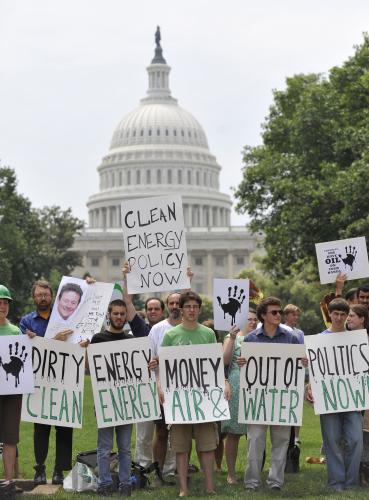|
 |
|
POLLUTION WOES: Protestors rally in front of Capitol Hill on July 20, three months after a BP drilling rig exploded in the Gulf of Mexico (ZHANG JUN) |
And it's not just a short-term moratorium, as the administration suggested. Since rigs are an expensive investment for companies, a number of rigs have already left to operate off the coasts of other countries. And because rigs are long-term investments, when they leave, they leave for good.
The president also used the opportunity the oil spill presented to push cap-and-trade legislation. But placing limits on carbon dioxide emissions is more of an attack on coal than on oil and would cause electricity prices to increase dramatically. Less than 2 percent of our petroleum consumption goes toward producing electricity. Cap and trade would do little to change the economics of petroleum use but a lot to increase consumers' electric bills.
Although cap and trade would increase the price of gasoline and would encourage people to drive less, the change in gas consumption would be marginal. Moreover, there is no commercially viable alternative to transportation running on fossil fuels, despite bureaucrats and lobbyists attempting to identify replacements that may never become practical. In fact, forcing consumers to use the much more expensive wind- and solar-generated electricity via cap and trade would only slow any changeover to electric vehicles.
When it came to actually cleaning the spill and protecting the environment, the government also failed miserably. The public demanded answers as to why it was taking an excruciatingly long time for the United States to accept help from foreign countries and international organizations offering booms, dispersants, skimmers, vessels, bird rehabilitation equipment, and expertise. But no answers were given.
The public wanted to know why the government continually rejected plans to build rock jetties, dykes, and sand berms. But the administration offered few reasons why and no alternatives, allowing the oil to invade delicate marshlands. The lack of response, lack of coordination, and lack of explanation fueled the public contempt for the government's management of the spill.
While the government is right to hold BP accountable for the spill and make sure they pay for all costs, the constant public vilification of the company was unnecessary. The public certainly has a right to be upset with BP, but all the government did was needlessly stoke that flame of anger. Citizens and activist groups organized boycotts on BP gasoline stations, but retail gasoline stations account for an insignificant portion of BP's revenues. The stations are primarily independent franchises; thus a boycott hurts family-owned small businesses and local distributors much more than it does the culprit of the spill.
The Gulf of Mexico oil spill would have presented a unique and unprecedented challenge for any administration. But, in virtually every way possible, the Obama administration gave the public a lesson on how not to handle an oil spill.
The author is a Washington, D.C.-based economist who focuses on free markets and environmental issues
(Viewpoints in this article do not necessarily represent those of Beijing Review)
| 